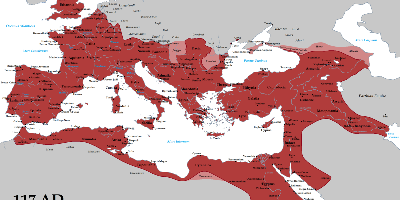13 nov 134 anni - Bar Kokhba Revolt Begins
Descrizione:
The Bar Kokhba revolt was a rebellion of the Jews of the Roman province of Judea, led by Simon bar Kokhba, against the Roman Empire. Fought circa 132–136 CE, it was the last of three major Jewish–Roman wars, so it is also known as The Third Jewish–Roman War or The Third Jewish Revolt. Some historians also refer to it as the Second Revolt of Judea, not counting the Kitos War (115–117 CE), which had only marginally been fought in Judea.The revolt erupted as a result of religious and political tensions in Judea following on the failed First Revolt in 66–73 CE. These tensions were related to the establishment of a large Roman military presence in Judea, changes in administrative life and the economy, together with the outbreak and suppression of Jewish revolts from Mesopotamia to Libya and Cyrenaica. The proximate reasons seem to be the construction of a new city, Aelia Capitolina, over the ruins of Jerusalem and the erection of a temple to Jupiter on the Temple Mount. The Church Fathers and rabbinic literature emphasize the role of Rufus, governor of Judea, in provoking the revolt.
In 132, the revolt led by Bar Kokhba quickly spread from central Judea across the country, cutting off the Roman garrison in Aelia Capitolina (Jerusalem). Quintus Tineius Rufus, the provincial governor at the time of the erupting uprising, was attributed with the failure to subdue its early phase. Rufus is last recorded in 132, the first year of the rebellion; whether he died or was replaced is uncertain. Despite arrival of significant Roman reinforcements from Syria, Egypt and Arabia, initial rebel victories over the Romans established an independent state over most parts of Judea Province for over two years, as Simon bar Kokhba took the title of Nasi ("prince"). As well as leading the revolt, he was regarded by many Jews as the Messiah, who would restore their national independence. This setback, however, caused Emperor Hadrian to assemble a large-scale Roman force from across the Empire, which invaded Judea in 134 under the command of General Sextus Julius Severus. The Roman army was made up of six full legions with auxiliaries and elements from up to six additional legions, which finally managed to crush the revolt.
The Bar Kokhba revolt resulted in the extensive depopulation of Judean communities, more so than during the First Jewish–Roman War of 70 CE. According to Cassius Dio, 580,000 Jews perished in the war and many more died of hunger and disease. In addition, many Judean war captives were sold into slavery. The Jewish communities of Judea were devastated to an extent which some scholars describe as a genocide. However, the Jewish population remained strong in other parts of Palestine, thriving in Galilee, Golan, Bet Shean Valley and the eastern, southern and western edges of Judea. Roman casualties were also considered heavy – XXII Deiotariana was disbanded after serious losses. In addition, some historians argue that Legio IX Hispana's disbandment in the mid-2nd century could have been a result of this war. In an attempt to erase any memory of Judea or Ancient Israel, Emperor Hadrian wiped the name off the map and replaced it with Syria Palaestina. However, there is only circumstantial evidence linking Hadrian with the name change and the precise date is not certain. The common view that the name change was intended to "sever the connection of the Jews to their historical homeland" is disputed.
The Bar Kokhba revolt greatly influenced the course of Jewish history and the philosophy of the Jewish religion. Despite easing the persecution of Jews following Hadrian's death in 138 CE, the Romans barred Jews from Jerusalem, except for attendance in Tisha B'Av. Jewish messianism was abstracted and spiritualized, and rabbinical political thought became deeply cautious and conservative. The Talmud, for instance, refers to Bar Kokhba as "Ben-Kusiba", a derogatory term used to indicate that he was a false Messiah. It was also among the key events to differentiate Christianity as a religion distinct from Judaism. Although Jewish Christians regarded Jesus as the Messiah and did not support Bar Kokhba, they were barred from Jerusalem along with the other Jews.
Aggiunto al nastro di tempo:
Data:
13 nov 134 anni
Adesso
~ 1892 years ago
